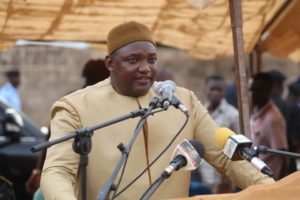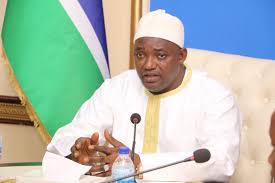
The President of the Republic Mr. Adama Barrow has warned that the political crisis that happened in The Gambia serves as a lesson for all leaders that power resides in the masses of the people, illustrating that if they represent the interest of the people, they would stand by them; but, if they oppress the people, they would abandon them.
Delivering a graduation lecture to the class of Course 26 of the National Defense College, Abuja, Nigeria, on Thursday 3rd August, 2018, the President admonished that such was the lesson drawn out of the almost two months’ political crisis in his country. “This is what has happened in The Gambia, and it serves as a lesson for all leaders,” he maintained.
“Therefore, no government could fool itself into believing that it can be business as usual forever. Politicians are often accused of making empty promises, yet they expect to be given the mandate to lead indefinitely. Nigeria, Ghana, Liberia, Sierra Leone, Senegal and The Gambia have shown clearly that politicians cannot continue to fool the electorate,” the president said.
The 27-page speech of the President was delivered to a hall-packed audience comprising military officers and students of the college.
A good number of them already visited The Gambia in April 2018 on a study tour, and met the President at the State House in Banjul.
The lecture was described as a great resource for students interested in the subject of post-conflict peace-building and democracy in the sub-region by Coordinating Officer of the National Defense College, Brigadier General Onumajuru.
The purpose of the presentation was to examine the importance of democratic principles and its direct link to conflict, post-conflict and peace-building. It was widely reviewed to have provided adequate background that would be useful to students of the college.
In the President’s lecture, he put focus on seven components discussed from the perspective of the military background of the students and their training. Although he admitted, he is a businessman and politician by profession with no military background.
President Barrow contended that a working definition was needed in discussing democratic principles and post-conflict peace-building.
He therefore quoted Abraham Lincoln’s definition of democracy as ‘government of the people, by the people and for the people’ – a simple definition that implies observing a number of principles, he said, adding it is worthy also to note that whilst the concept and practice of democracy vary globally, there are generally acceptable core elements.
“These elements include freedom, justice, rule of law, respect for the individual rights of each citizen and political pluralism… all citizens must lawfully have a voice and have the freedom and right to form and belong to political parties and to participate in free, fair and open elections that are held periodically to elect their leaders and representatives in accordance with the law. Thus, democratic governance is acknowledged as the political basis for a stable and secure environment to ensure national progress, development, peace and security,” he explained.
The President also noted that no meaningful development can take place in the absence of true democracy, respect for human rights, peace, security and good governance.
“It must be emphasized further that instituting a stable democratic government requires constitutionally vibrant and independent institutions that are governed by the separation of powers in relation to the Executive, Legislature and the Judiciary. The absence of these principles breeds dictatorship and its consequences. Lessons learnt globally show that dictatorship always leads to a change of government; and if a peaceful change of government is made impossible, a violent change becomes inevitable. This was the state of affairs in The Gambia up to January 2017. Aside from exercising restraint, we were able to avert bloodshed with the help of the international community,” he explained.
And, how Gambians found themselves in a crisis situation… how were they able to walk out of it, informed President Barrow’s deliberation to the graduating class, moving on to explain his seven-point explanations, some of them as thus:
Key Democratic Principles: President Barrow defines this as one of the core principles of peaceful co-existence in a democratic society – “Abraham Lincoln is reported to have said, ‘As I would not be a slave, so I would not be a master’. This expresses my idea of democracy. Do we not say, ‘Do unto others as you would want them do unto you?’ Of course, we do!”
Transparency and Accountability in institutions and organisations: President Barrow defines Transparency as a fundamental ingredient in good governance. “Without access to information, it would be impossible to hold public servants accountable. A non-transparent government creates an environment conducive to a range of abuses and undermines the professionalism of the people running its institutions and organizations. In consequence, democratic accountability in governance means that the organizations are answerable to civil authority within a democratic framework.”
The role of the Professional Security Forces in Democratic Governance: “Professionalism of the security apparatus of a country is a central element of democratic governance, and forms part of any transformation strategy.
Absolute control by the civil authority over the security is impossible. Accordingly, there should be shared responsibilities within the framework of democratic prudence. Importantly, the professional security forces need to accept their subordination in policy and resource allocation to the civil authority and refrain from engagement in divisive activities.”
On this point, the President said it was unfortunate that, in The Gambia, the former President deliberately undermined the degree of professionalism of the security forces by involving security personnel in partisan political and commercial activities.
Jammeh also interfered in areas that the security organisations were to exercise administrative competence, technical judgment and decisive action.
Challenges of Democratic Governance: Democratic governance requires a holistic approach in transforming the institutions and organisations to professional standard for them to live up to expectations.
The challenges faced in transforming any sector in a democratic country are similar to those confronted by the security sector due to the special roles security forces play in their country’s political and economic systems.
President Barrow cited a few common challenges embedded in the transformation of the security sector in a democracy.
These he said, have to do with the challenges of transforming the security sector in a country that does not have a tradition or culture of democratic norms, values and principles. “It also requires understanding the political and social context of transformation against the economic realities that exist. The other tasks include moving beyond the defence sector without undermining national security as well as dealing with low literacy rates that are compounded by huge competency or capacity gaps,” he said.
“Striking a balance between democratic control, on one hand, while allowing for empowerment, professionalism and self-discipline, on the other are equally challenging. For democratic principles to prevail in any country, these challenges must be overcome. In The Gambia, “we are in the process of transforming our institutions, and we have to address the challenges I have just mentioned”.

